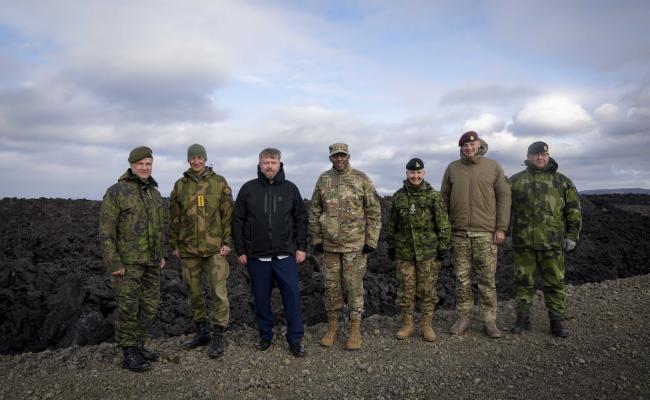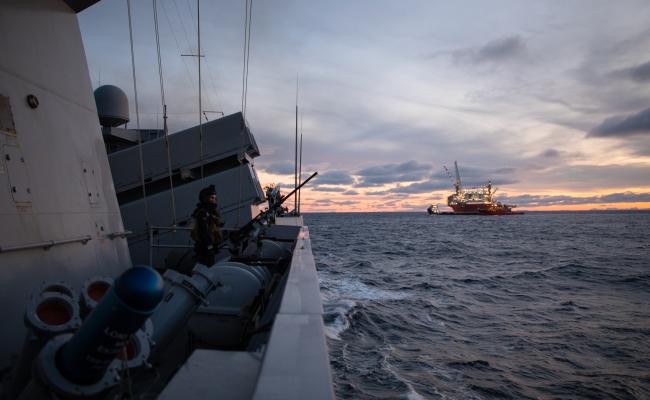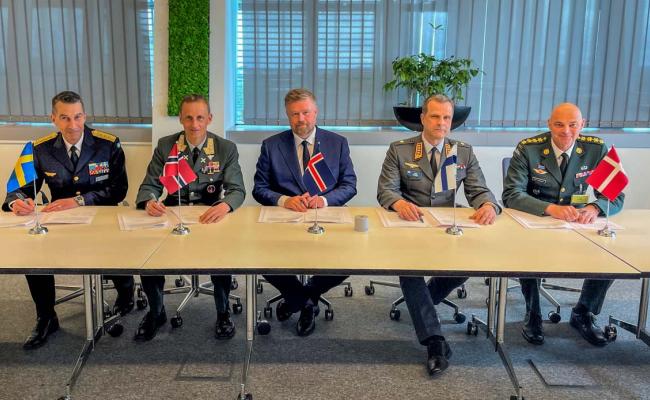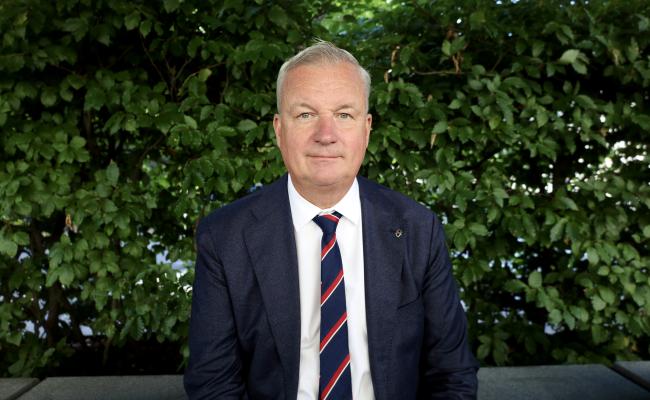Arctic Defense Ministers to Enhance Cooperation on Security and Defense in the Region
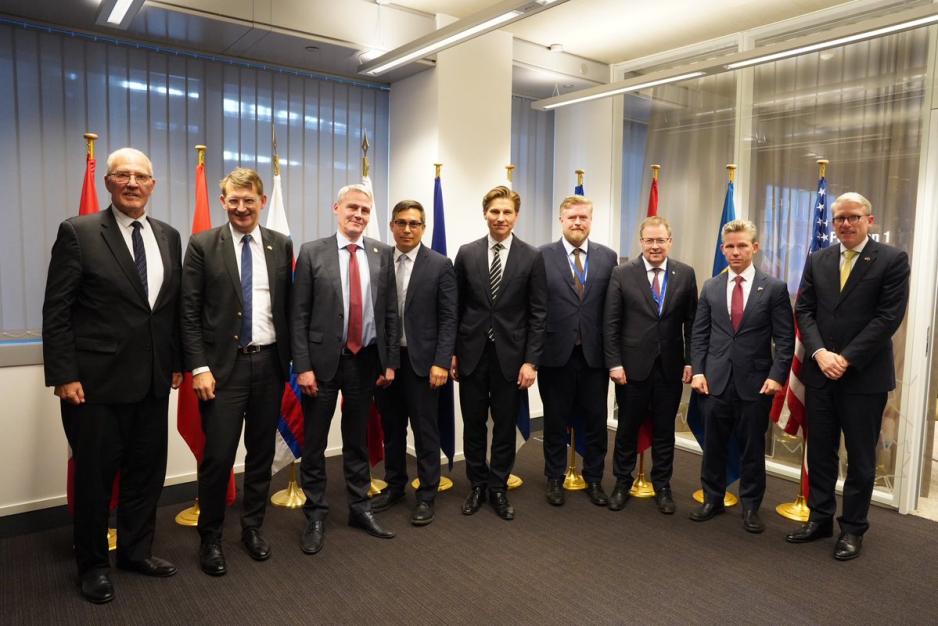
Gathered in Brussels (from left): Canada’s MoD Bill Blair; Denmark’s MoD Troels Lund Poulsen; the Faroese Minister of Foreign Affairs, Høgni Hoydal; Greenland’s Permanent Secretary of Statehood and Foreign Affairs, Mininnguaq Kleist; Finlands MoD Antti Häkkänen; Iceland’s Director General for Defense and Chief of Defense, Jónas Allansson; Norway’s MoD Bjørn Arild Gram; Sweden’s MoD Pål Jonsson – and Deputy Defense Advisor in the US Mission to NATO, David F. Helvey. (Photo: The Government of the Faroese Islands)
The defense ministers and other representatives of the Arctic NATO countries, including the Faroe Islands and Greenland, recently met at the alliance's headquarters in Brussels. They discussed topical regional security issues and reaffirmed their shared commitment to increased cooperation in the Arctic.
On Thursday, Canadian Defense Minister Bill Blair hosted a Northern Defense Dialogue with Arctic allies on the margins of the NATO defense ministers meeting in Brussels.
The dialogue meeting brought together the defense ministers and other representatives of all the Arctic NATO states, including the Faroe Islands and Greenland, as part of the Kingdom of Denmark.
In a joint statement from the meeting, they reaffirm their joint commitment to enhanced cooperation on security and defense in the Arctic.
Building on the work of and aiming also to strengthen NATO, they discussed the following:
- The countries' situational awareness of the threat environment in the Arctic and opportunities to enhance information and intelligence sharing in order to develop a common operational picture.
- Emerging threats, risks, and geopolitical challenges from potential adversaries at both the national and international levels.
- The countries' capabilities to deter and, if necessary, defend against threats from potential adversaries in the region, as well as a commitment to mutual participation in joint operations and exercises to enhance interoperability.
- Ways to increase collaboration to address common threats and challenges posed to the region.
Unprecedented challenges
“In a rapidly changing geopolitical landscape marked by new challenges, the Arctic region has become a growing global point of focus,” says the parties in the joint statement.
They point out that the following challenges are unprecedented and underline the need to foster deepened cooperation among like-minded Arctic states:
“Climate change is having profound effects on the strategic and operational environment, and growing access to the Arctic’s resource potential is enticing new non-Arctic actors to the region. Potential adversaries are rapidly developing their militaries’ ability to operate both in the High North and the circumpolar Arctic region.”
“Among its many negative consequences, Russia’s illegal and unprovoked further invasion of Ukraine has caused grave impediments to international cooperation and degraded the Euro-Atlantic security environment.”
Also read (the article continues):
Deterrence and low tension
Finland and Sweden’s accession to NATO significantly strengthens the alliance’s collective defense posture and capabilities in the Arctic, the parties point out and continue:
“As all like-minded Arctic states now belong to the alliance, we affirm our leading role in NATO’s work relating to the region and stress the importance of maintaining a credible deterrence and defense in the entire Euro-Atlantic area –including our northern regions – as well as cooperation with our other NATO Allies to this end.”
The Arctic defense ministers and representatives also express a continued ambition for low tension and stability in the North:
“Our countries’ common ambition to maintain low tension in the region has served as the foundation of our multilateral Arctic relations and will continue to guide our cooperation in the future.”
“Guided by the core principles of multilateral cooperation, territorial integrity, and maintaining the rules-based international order, we are committed to strengthening our collaboration to address complex global challenges and maintain the Arctic as a stable, peaceful, and prosperous region.”
Insists on having a say
The Faroe Islands and Greenland have traditionally not been represented at the ministerial table during discussions of international defense issues, but this spring's NORDEFCO meeting of defense ministers, the autumn's Canadian-Nordic Strategic Dialogue, and this Northern Defense Dialogue in Brussels indicate a change.
“We in the Faroe Islands have insisted on taking a direct part in discussions on security and defense issues with our own representation, so that we are not spectators, but take responsibility,” says Faroese Foreign Minister Høgni Hoydal.
“The increasingly uncertain situation in the world requires that we take an active part in the design of security and defense policy measures in the North. This shall be done on a regular and democratic basis,” he maintains.
According to the Faroese Ministry of Foreign Affairs, the Arctic defense ministers and representatives also agreed to meet annually.
New Arctic project in NATO
At the NATO defense ministers meeting, a new multinational cooperation initiative was launched to enhance defense in the Arctic region within space technology.
In the NORTHLINK project, 13 allied countries will explore the development of a secure, resilient, and reliable multinational Arctic satellite communications capability.
The cooperation partners are the seven Arctic states – Canada, the United States, Norway, Denmark, Finland, Sweden and Iceland – as well as France, Germany, Hungary, Italy, the Netherlands and Luxembourg.


